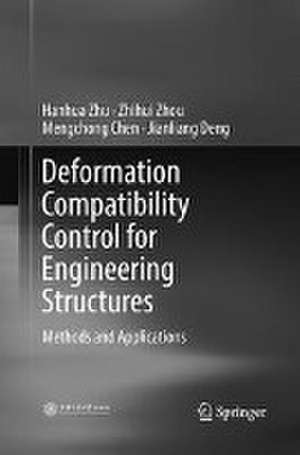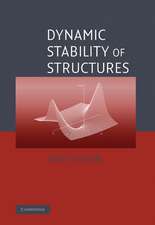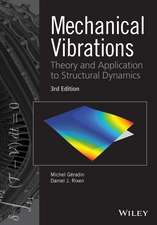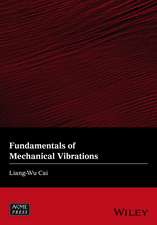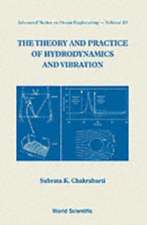Deformation Compatibility Control for Engineering Structures: Methods and Applications
Autor Hanhua Zhu, Zhihui Zhou, Mengchong Chen, Jianliang Dengen Limba Engleză Paperback – 7 iul 2018
Though equilibrium theory in engineering structures has been extensively studied, there has been comparatively little research on compatibility. In the limited researches available, the topics are primarily the theories and assumptions on the deformation compatibility, while few systematic works focus onthe mechanical theoretical principles and methods of deformation compatibility control. As such, the flexibility of the construction material in force transmission and the stable equilibrium of the structure as a whole cannot be guaranteed based on these research results.
Successfully addressing this important gap in the literature, the book is intended for researchers and postgraduates in engineering mechanics, civil engineering and related areas.
| Toate formatele și edițiile | Preț | Express |
|---|---|---|
| Paperback (1) | 632.22 lei 6-8 săpt. | |
| Springer Nature Singapore – 7 iul 2018 | 632.22 lei 6-8 săpt. | |
| Hardback (1) | 638.43 lei 6-8 săpt. | |
| Springer Nature Singapore – 3 ian 2017 | 638.43 lei 6-8 săpt. |
Preț: 632.22 lei
Preț vechi: 743.79 lei
-15% Nou
Puncte Express: 948
Preț estimativ în valută:
120.99€ • 125.60$ • 100.89£
120.99€ • 125.60$ • 100.89£
Carte tipărită la comandă
Livrare economică 22 martie-05 aprilie
Preluare comenzi: 021 569.72.76
Specificații
ISBN-13: 9789811094712
ISBN-10: 9811094713
Ilustrații: XII, 116 p. 84 illus., 45 illus. in color.
Dimensiuni: 155 x 235 mm
Greutate: 0.19 kg
Ediția:Softcover reprint of the original 1st ed. 2017
Editura: Springer Nature Singapore
Colecția Springer
Locul publicării:Singapore, Singapore
ISBN-10: 9811094713
Ilustrații: XII, 116 p. 84 illus., 45 illus. in color.
Dimensiuni: 155 x 235 mm
Greutate: 0.19 kg
Ediția:Softcover reprint of the original 1st ed. 2017
Editura: Springer Nature Singapore
Colecția Springer
Locul publicării:Singapore, Singapore
Cuprins
Method of deformation compatibility control for engineering structures.- Adaptability of engineering structure system and mechanical analysis.- Three findings on the safety of engineering structure.- Two understandings on the mechanical principles in the engineering structure.- Concentration of damages at the weak location of structures due to the incompatible deformation.- Comprehensive control on the deformation of structure.- Applications of deformation compatibility control methods in traffic structure engineering.- Optimized transmission or transfer of force in structural system related with the deformation compatibility control.- Applications in bridge structure.- Applications in tunnel engineering.- Applications in the solution to “vehicle jumping on bridge ends”.- Comments of Jun Sun (Academician of China Engineering Academic).
Textul de pe ultima copertă
This book presents essential methods of deformation compatibility control, and explicitly addresses the implied conditions on the methods’ deformation compatibility. Consequently, these conditions can be considered in engineering structure design, while the conditions on stable equilibrium can be taken into account in the design method. Thus, the designed deformation and the actual deformation of the respective structure are approximately identical, guaranteeing both the flexibility of the construction material in force transmission and the equilibrium of force in the structure.
Though equilibrium theory in engineering structures has been extensively studied, there has been comparatively little research on compatibility. In the limited researches available, the topics are primarily the theories and assumptions on the deformation compatibility, while few systematic works focus onthe mechanical theoretical principles and methods of deformation compatibility control. As such, the flexibility of the construction material in force transmission and the stable equilibrium of the structure as a whole cannot be guaranteed based on these research results.
Successfully addressing this important gap in the literature, the book is intended for researchers and postgraduates in engineering mechanics, civil engineering and related areas.
Though equilibrium theory in engineering structures has been extensively studied, there has been comparatively little research on compatibility. In the limited researches available, the topics are primarily the theories and assumptions on the deformation compatibility, while few systematic works focus onthe mechanical theoretical principles and methods of deformation compatibility control. As such, the flexibility of the construction material in force transmission and the stable equilibrium of the structure as a whole cannot be guaranteed based on these research results.
Successfully addressing this important gap in the literature, the book is intended for researchers and postgraduates in engineering mechanics, civil engineering and related areas.
Caracteristici
Addresses in detail the methods of deformation compatibility control for engineering structures Describes a series of case studies on the methods of deformation compatibility control Presents essential techniques in deformation compatibility control and safety control in the context of structural design and construction Includes supplementary material: sn.pub/extras
